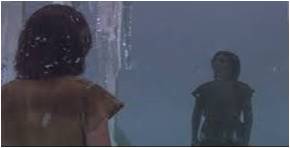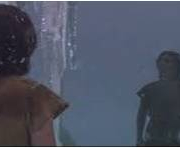What will the Kingdom of God on Earth be like
Mirror on God’s Kingdom on Earth
When the Apostle Paul wrote to the church at Corinth he said:
 “For now we see in a mirror dimly, but then face to face…”(1 Corinthians 13:12).
“For now we see in a mirror dimly, but then face to face…”(1 Corinthians 13:12).
Paul was referring to the rather imperfect mirrors of the day, using this lovely image to explain that today we cannot fully comprehend the future, but we will do so in due course. We are not given many detailed descriptions of what the future Kingdom of God will be like. We know the Kingdom of God will be established at the return of Jesus to the earth, and we know that it will be incomparably better than anything which exists now. But how much do we know about it?
The last book of the Bible says:
“Then I saw thrones, and seated on them were those to whom the authority to judge was committed… They came to life and reigned with Christ for a thousand years” (Revelation 20:4).
Twice more in the following verses, we read, “when the thousand years are ended” (v4, 7). The initial phase of the Kingdom of God appears to be a one thousand year period, with both mortal and immortal parts to the population.
This is the period we call ‘the Millennium’. It is followed by a further time which has no end.
This idea is supported by the Apostle Paul, who talks about an initial phase in which Jesus reigns, without specifying the period. During this time, Jesus removes all opposition to his reign, and then he can hand over the kingdom to his Father, the Lord God.
“Then comes the end, when he delivers the kingdom to God the Father after destroying every rule and every authority and power. For he must reign until he has put all his enemies under his feet… that God may be all in all” (1 Corinthians 15:24–25, 28).
The Beginning and the End
What do we know about the Millennium and the period which follows it?
The Bible opens with a picture of what God originally planned.
“God saw everything that He had made, and behold, it was very good” (Genesis 1:31).
The record in Genesis continues:
“Out of the ground the LORD God made to spring up every tree that is pleasant to the sight and good for food. The tree of life was in the midst of the garden, and the tree of the knowledge of good and evil” (Genesis 2:9).
This sounds idyllic: Eden was a wonderful place in which to live, the place that God intended for the first man and woman. Later in the chapter we read, “The LORD God took the man and put him in the garden of Eden to work it and keep it” (Genesis 2:15).
The man and woman were not just left to be at leisure, they had work to do. It does not appear that this was a burden to them, as work was later to become. We discover that the man Adam, and Eve his wife, must have spent time in the evening of each day communing with the angel who represented God. “And they heard the sound of the LORD God walking in the garden in the cool of the day” (Genesis 3:8). This reads as if this was something which happened routinely.
For Adam and Eve, life in the Garden of Eden must have been a paradise.
They had all they needed, an ideal climate, no threats of danger, nothing to fear. There was sufficient food, pleasant work to do, and at the end of the day they spent time in the company of an angel. If all that is to be restored in the Kingdom of God, what a wonderful existence it will be. That seems to be the prospect held out also at the end of the Bible:
“Then the angel showed me the river of the water of life, bright as crystal, flowing from the throne of God and of the Lamb through the middle of the street of the city; also, on either side of the river, the tree of life with its twelve kinds of fruit, yielding its fruit each month. The leaves of the tree were for the healing of the nations. No longer will there be anything accursed, but the throne of God and of the Lamb will be in it, and his servants will worship him.” (Revelation 22:1–3).
This last prophecy of all gives a picture of the garden of Eden restored, but now on a larger scale, able to hold a much bigger population. The leaves of the tree of life are there to heal the nations, which demonstrates the loving provision of the Lord God, for they are in desperate need of healing.
The curse which followed the sin of Adam and Eve will be removed. It is a continuation of the scenario in Eden.
Right in the middle of this vision of the future is the throne of the Lord God, and also of the Lamb, the Lord Jesus Christ.
Peace and Worship
Other Bible passages tell us a little about life in God’s Kingdom; many are in the prophecy of Isaiah.
“It shall come to pass in the latter days that the mountain of the house of the LORD shall be established as the highest of the mountains, and shall be lifted up above the hills; and all the nations shall flow to it, and many peoples shall come, and say: “Come, let us go up to the mountain of the LORD, to the house of the God of Jacob, that He may teach us His ways and that we may walk in His paths.” For out of Zion shall go the law, and the word of the LORD from Jerusalem. He shall judge between the nations, and shall decide disputes for many peoples; and they shall beat their swords into plowshares, and their spears into pruning hooks; nation shall not lift up sword against nation, neither shall they learn war anymore”(Isaiah 2:2–4).
This message is so important that it is also found in the book of Micah chapter 4. It demonstrates that God’s law will be imposed, replacing all the fallible systems of law which now operate. This is willingly accepted by the population, although not everyone elects to go to God’s house, so it must be speaking about the Millennium.
Perhaps the most encouraging part of the prophecy comes at the end. God’s judgment is to be imposed on all nations. Instead of energy and resources being used for armaments, they will be used to produce food. The prospect of never seeing a picture of a starving child ever again is a great reason to take notice of these verses.
The idea that nations will not take up arms against another nation is also wonderfully appealing. So many lives are lost, or irretrievably scarred by war, and Isaiah promises that people will not even learn how to fight and make war.
irretrievably scarred by war, and Isaiah promises that people will not even learn how to fight and make war.
A New Start
The end of Isaiah’s prophecy has this wonderful vision:
“For behold, I create new heavens and a new earth, and the former things shall not be remembered or come into mind. But be glad and rejoice forever in that which I create; for behold, I create Jerusalem to be a joy, and her people to be a gladness” (Isaiah 65:17–18).
Jerusalem today is seen as a difficult place: holy for three of the world’s major religions; a city which has been more fought over than almost any other; a place whose history is full of tears and conflict; constantly associated with strife and trouble. Yet its name means “City of Peace”! The prophet sees it as somewhere which will become a place of joy.
“No more shall there be in it an infant who lives but a few days, or an old man who does not fill out his days, for the young man shall die a hundred years old, and the sinner a hundred years old shall be accursed” (v20).
This is clearly looking at a population of people who are mortal. For those members of the public who are fortunate enough to survive the coming judgements and who then live in God’s Kingdom, theirs will be a long life free of the dangers that now exist.
Isaiah’s picture continues to describe a life of peace and safety, with oppression and crime removed:
“They shall build houses and inhabit them; they shall plant vineyards and eat their fruit. They shall not build and another inhabit; they shall not plant and another eat; for like the days of a tree shall the days of my people be, and my chosen shall long enjoy the work of their hands” (v21-22).
Pictures of Paradise
These prophecies set out for us what God’s Kingdom will be like. In the same way that builders sometimes present an ‘artist’s impression’ of what a new development will look like, Isaiah gives us a ‘preview’ of the Kingdom. It is always interesting to compare the artist’s impression with the reality. For those who are in God’s Kingdom, they will be able to compare the kingdom with the visions which
Isaiah saw.
“The wolf and the lamb shall graze together; the lion shall eat straw like the ox, and dust shall be the serpent’s food. They shall not hurt or destroy in all My holy mountain,” says the LORD (v25).
 Not many miles from where we live there is a zoo, with a variety of animals in cages or enclosures so that you can see them safely. Some find it quite cruel, and I confess I have not been for a long time. I am sure, however, that there are no wolves and lambs in the same cage, nor would a zoo–keeper last long if he fed straw to the lions.
Not many miles from where we live there is a zoo, with a variety of animals in cages or enclosures so that you can see them safely. Some find it quite cruel, and I confess I have not been for a long time. I am sure, however, that there are no wolves and lambs in the same cage, nor would a zoo–keeper last long if he fed straw to the lions.
Isaiah, writing under the inspiration of the Holy Spirit, is painting another picture of God’s Kingdom for us, a place which will have been vastly transformed from all that we experience now. There are many other details which we would love to know, but we can see already that life in God’s Kingdom will be vastly better than today’s world.
Not For Everyone!
There is just one worrying feature of all this. Not everyone will be in that kingdom. The Bible makes it clear that not everyone will be raised from death, and not all of those raised will be accepted. For example:
“Many of those who sleep in the dust of the earth shall awake, some to everlasting life, and some to shame and everlasting contempt” (Daniel 12:2).
We must allow ourselves to be so enthused by these visions of life in the Kingdom, that we become determined to be there, that we do not allow anything to get in the way of us following the Lord Jesus.
By reading our Bibles and discussing these wonderful pictures with others, we can develop that knowledge and enthusiasm, which will fill our lives now with purpose and give us a real hope for the future.
By Mark Sheppard
![]()

